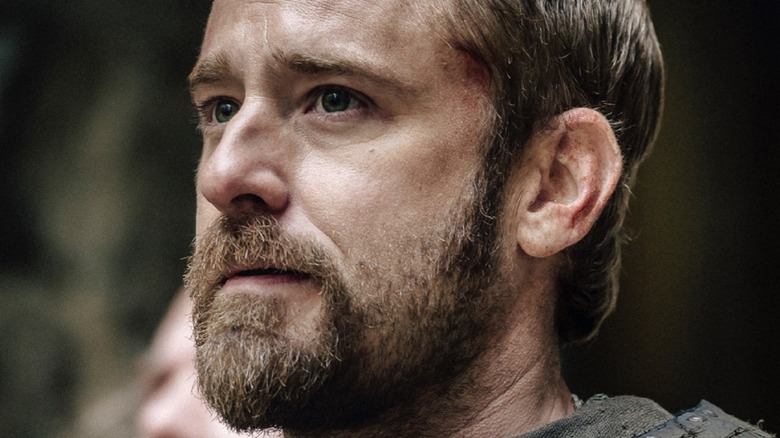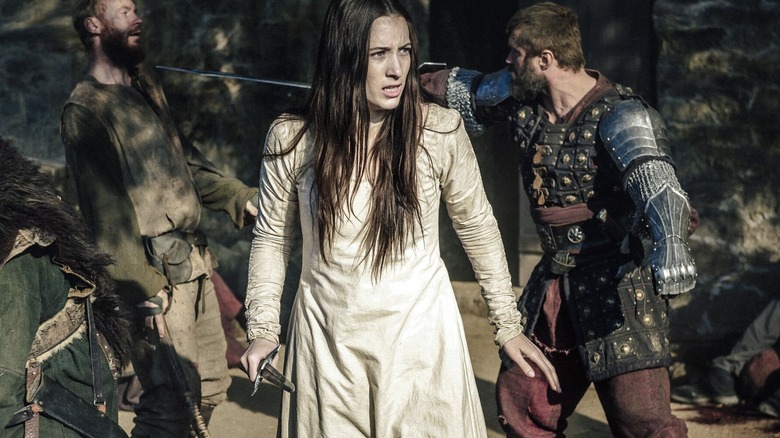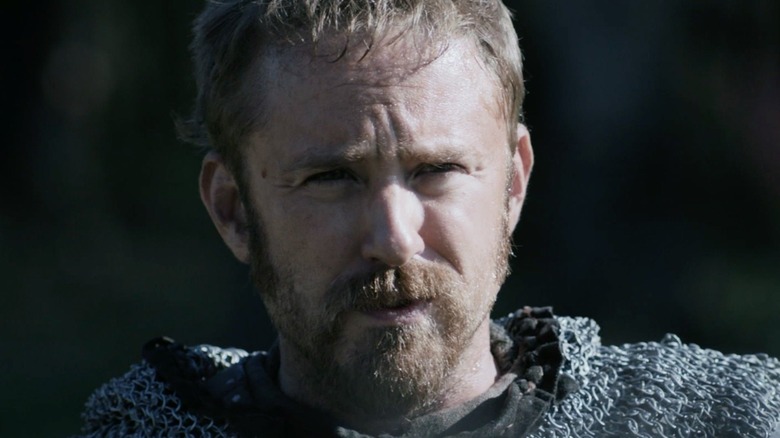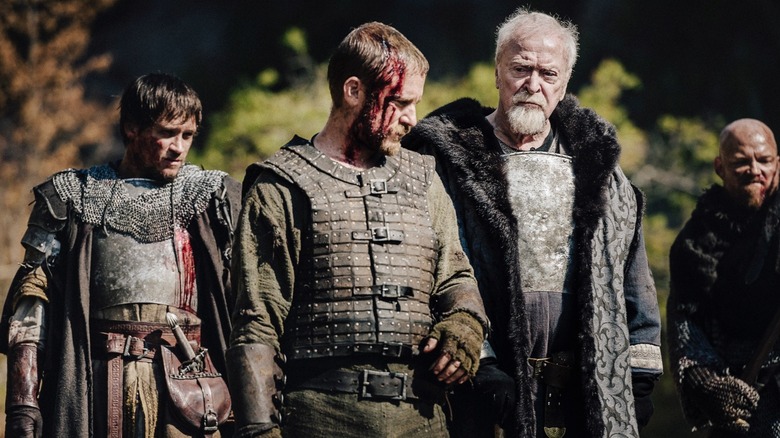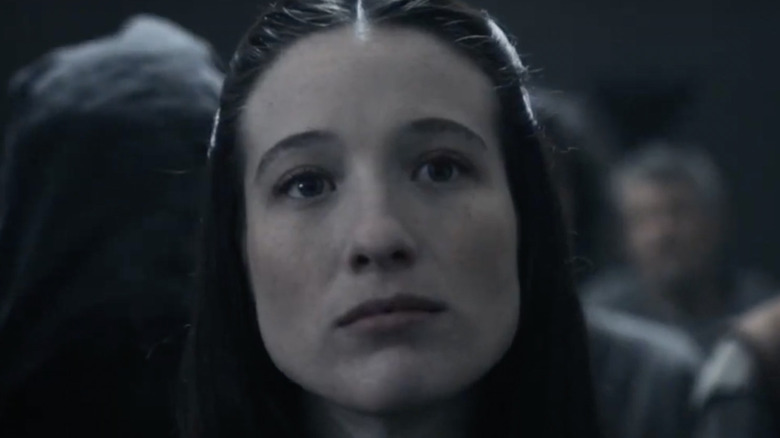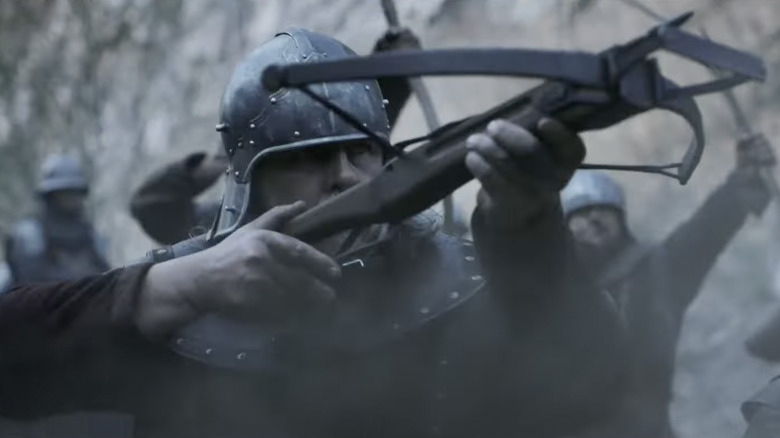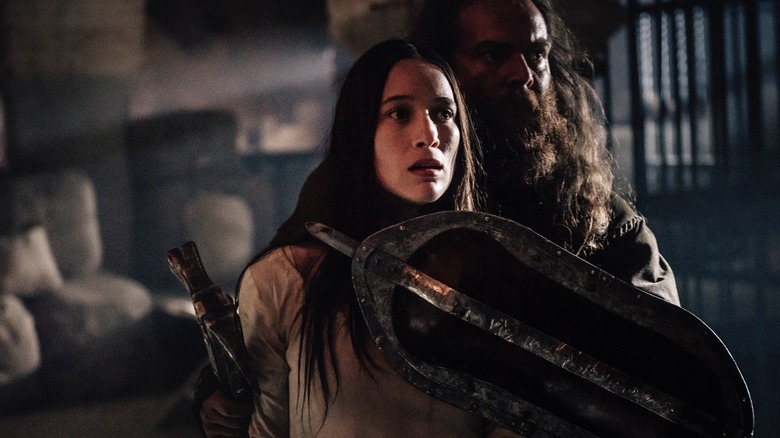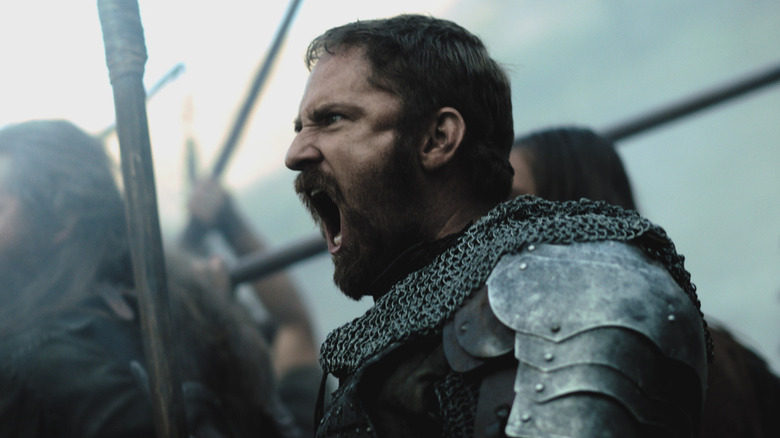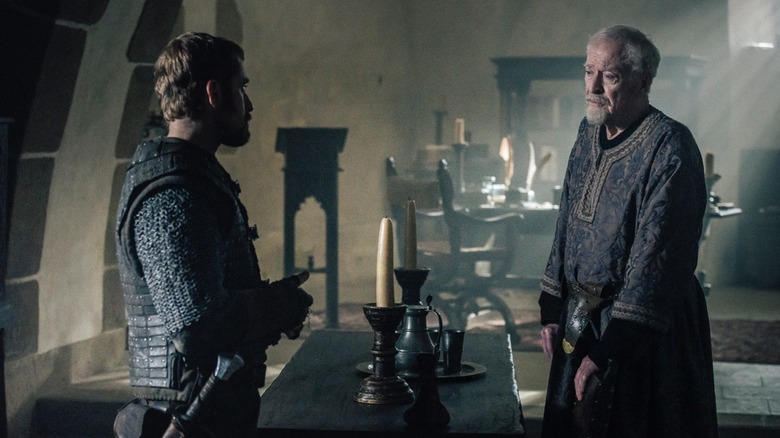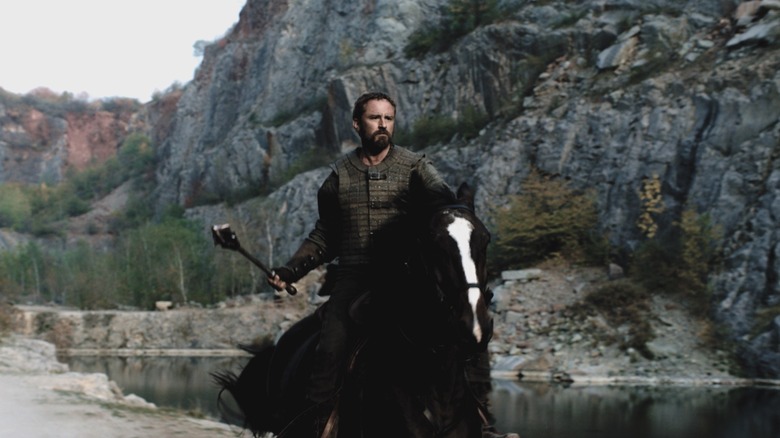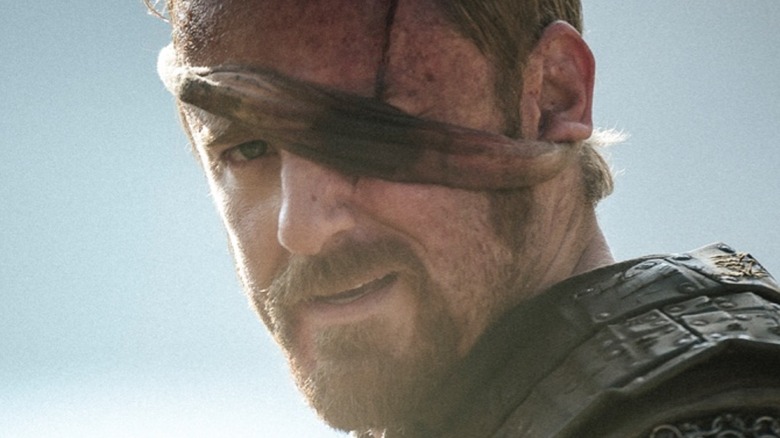The Ending Of Medieval Explained
The deeds of real-life military genius and Czech hero Jan Žižka (Czech now, Bohemia then) have finally made it to modern cinema in the form of "Medieval," a film whose name aptly describes both the movie's archaic setting and its raw, brutal combat. Ben Foster plays Žižka, and the actor's trademark stoic silence ironically helps bring the historical figure to life, making every sudden swing of his mace seem like an explosion of righteous fury. The story follows the rise of this near-mythic commander as he becomes embroiled in a civil war between forces loyal to the King of Bohemia, Wenceslaus IV (Karel Roden), and his half-brother, the Hungarian King Sigismund (Matthew Goode). If you're a fan of medieval movies, or even just fun, fresh action, then "Medieval" is worth your time. In addition to its battles, blood, and bones, director Petr Jákl manages to thread some subtle and meaningful allusions, symbols, and historical references throughout, making the movie's end worth explaining.
The central plot of "Medieval," the story of Žižka's rise to prominence, takes place amid a staggeringly complex series of political and religious conflicts in the 15th century, and for that reason alone, there is a lot behind "Medieval" worth looking into. But the movie's characters, dialogue, and shots also hide secrets beneath their surfaces, making the movie deeper than you might expect. In those depths swim a number of existential questions, religious debates, and evolving moralities. We'll plumb those depths here as we explain the ending of "Medieval."
God's will vs. my will
From start to finish, "Medieval" challenges its protagonists with one burning question: What is God's will? Of course, from there, a multitude of other questions arise to vex Žižka, Katherine (Sophie Lowe), and the rest of the main cast: Is the king's will the same as God's? Should we follow either or both? What if our will, our hard-won morality and humanity, sets us on the opposite path as the king, the church, the country, and even God? As the movie progresses, Žižka and Katherine, especially — who had been betrothed to a tyrannical nobleman, Henry III of Rosenberg (Til Schweiger), until she seems him for who he is — find themselves struggling to answer these questions, until the fires of war forge new insights.
Nearing the end of the film, in the period that screenwriting educator Blake Snyder would call the "dark night of the soul," Katherine has reached her limit in terms of the amount that she can be used as a political pawn. After around two hours of film that so often debates "God's will" and "the king's will," Katherine finally stands up proudly and confidently declares that from then on, she acts by "my will." It's a huge moment for her character and one that ultimately pushes Žižka to reach his own enlightenment, too. While Katherine learns to draw her strength from within, Žižka learns to finally accept strength from without — after years spent as a roving mercenary with a Han Solo-esque indifference, Žižka begins fighting for his fellow countrymen instead of for coin.
Žižka's armor
One of the most subtle recurring themes in "Medieval" is its characters' relationship to their armor, specifically the way in which a warrior's armor mirrors their motivation and moral compass. To paint the theme with broad strokes, the bad guys in "Medieval" — the treacherous Torak's (Roland Møller) mercenaries and King Sigismund's knights — tend to turtle up and hide behind walls while the good guys, like Žižka and the Hussite rebels, tend to gift their armor to those who need it most, regardless of personal danger.
In the most telling scene, Žižka leaves his steel plate armor behind for a local peasant boy to use, even though Žižka is at that very moment out on a quest to single-handedly defeat Torak and his platoon of hardened soldiers. The moment marks a change in Žižka from selfish merc to a man of the people, and it's a major step on his way to becoming the national hero the Czech people now remember him as. By the movie's end, Žižka has lost nearly all of his armor, either voluntarily or not, and arrives at his final battle with Torak both literally and symbolically stripped of his past profession and life. Žižka giving that boy his armor was symbolic of him beginning to focus on protecting his country over himself.
The hunting castle battle
The main plot of "Medieval" sees Žižka and his band of warriors forced to kidnap Katherine, which sets Žižka on an unforeseen journey into a wider world of politics and war. All the battles, manhunts, and sparks of rebellion culminate in one final conflict at the hunting castle of King Wenceslaus IV of Bohemia. Every major player and faction in the movie who's still alive finally converges in one location to have it out — aside from those elites with the privilege of conducting their wars from afar, like King Sigismund and Lord Rosenberg.
Due to its placement in the third act, the hunting castle battle is the only fight in the entire movie in which the true motivations of every faction are made manifest, and they're reflected in how each of them carries themselves throughout. The knights who work for Sigismund and Rosenberg, as well as the Cuman mercenaries they're allied with, suffer through the battle nervously and half-heartedly — even terrified, once Žižka unleashes a lion on them. Žižka's rebels, on the other hand — and by this point, they are well and truly Žižka's — fight with a passion and ferocity that can only come from lifelong oppression.
Interestingly, the only force to oppose Žižka and his rebels with a similar fury is Torak, the mercenary commander in the employ of Sigismund. By this point, he's stopped feigning deference to the king and loyalty to his country. Instead, he now makes it clear with both his words and actions that his only goal is killing Žižka.
I know how it feels
Several characters in "Medieval" go through complete or semi-complete character arcs, but none more obviously and extremely as Katherine. After her first few appearances, she could easily be mistaken for any of the elves from "Lord of the Rings" — she wears fine silk gowns, is often astride a beautiful white mare, and is shot to look as if she is constantly bathed in a heavenly glow. Her social status affords her not only extreme luxury but also ignorance — she spent the first couple of decades of her life blissfully unaware of the suffering of her people. That ignorance is what makes her last line before her death, "I know how it feels," so moving.
During the battle of King Wenceslaus IV's hunting castle, Katherine decides to remove her usefulness as a political pawn from the playing field, depriving both men of the prize they're fighting over, and she leaps from the castle walls. Despite Žižka's valiant dive after her and his success in bringing her to shore, she only lives for another few moments. In this last bit of her life, Katherine tells Žižka everything is okay because now she knows "how it feels." This could be read as her finally understanding the suffering of her people, finally doing something major of her own will alone, or even as her understanding what Jesus Christ felt like as a martyr for his cause, but by any interpretation, Katherine dies having evolved tremendously from her passive role at the start of the drama.
The hawk
A handful of times throughout "Medieval," Žižka's gaze lingers on a hawk in flight, whether real or remembered. The bird is always seen high in the sky, soaring majestically and seemingly free. Its appearance tends to provide punctuation for the movie's most violent and difficult scenes, offsetting brutality with a brief moment of stillness or using the hawk's associations with predation and war to double down on the grimness. One of the most memorable, for example, comes when Žižka has been tied up and left for dead by his traitorous mercenary squad. As he opens his eyes, the hawk soars overhead, reminding him of everything he's lacking and everything he needs. The hawk is more than just a piece of recurring symbolism, however — in the last third of "Medieval," we finally learn exactly why hawks have fascinated Žižka so deeply and for so long, and how they led to the death of his first love.
As Žižka tells Katherine, "The king's knights hanged Anna for killing a hawk. I tried to stop them but my father made me understand that what had happened was right because the king's law was God's law." For all of Žižka's adult life, hawks represented his deepest sadness — the death of his childhood love, Anna — and the maddening equation between king and God in the eyes of his country, its people, and its laws. After his revelation to Katherine, the next (and last) hawk we see takes flight upon Katherine's death, thereby symbolizing the point at which Žižka finally, officially transitions from sellsword to resistance leader.
Violence and hope
The very first scene in "Medieval" sees Žižka pushing a galloping warhorse across a battlefield. As its hooves smash deep into the wet ground, it not only kicks up mud and undergrowth, but the image also conjures a steady, thudding percussion that underscores Michael Caine's dramatic voice-over. Caine, as the fictional Lord Boresh, waxes philosophical about his life, the turmoil of his country, and the state of modern (i.e. medieval) society in general, and it all begins with one word: violence.
Caine begins his speech with "Violence. Intrigues. Power." And he proceeds to explain how everything has "changed for the worst" in his home country of Bohemia following recent political and religious upheavals. The speech is a suitably bleak introduction to the movie, and it has an equally apt twin monologue at the end of the movie. This time, Foster narrates, but instead of Boresh's "Violence. Intrigues. Power," Žižka says, "Honor. Justice. Freedom. Faith. Hope." Like Caine's, Foster's monologue unfurls over footage of Žižka riding into battle, but this time — in the movie's final few seconds — the words and image leave a promising impression on the viewer.
While the dialogue that opens "Medieval" sets up the desperate, depressing struggle that triggers the film's drama, the dialogue that closes the movie sets up the resolution. For too long, the Bohemian territories (alongside much of the rest of Europe) suffered as a result of the Western Schism, the many ensuing civil wars, and the general tyranny of medieval autocrats. With Žižka's final words in "Medieval," he is able to at least express hope about one nation's survival through all the troubles of that age.
Alone and together
In the same way that "Medieval" opens with a scene-setting monologue and closes with a variation of the same, it also uses the same action sequence to serve as the backdrop to those speeches — and this time, the parallels and differences between the two are even more striking. While the twin speeches match each other in scale and present juxtaposing viewpoints — that is, violence versus hope — the two visual scenes are almost identical but end differently enough to change viewers' entire outlook on the war, its participants, and even the eventual status of Europe and the papacy.
As "Medieval" opens, Žižka rides a horse whose stomping hooves beat out a steady rhythm that accents Caine's monologue about their failing country. Then, when the scene is repeated in the movie's last moments, everything about it and its implications pulls a sociopolitical U-ey.
While the opening scene implies that Žižka rides alone, when the scene recapitulates at the end, we finally realize that to be a deception. The movie's final moments reveal that Žižka's seemingly doomed gallop is in fact a ride meant to direct his forces — his numerous Hussite forces, aided by dozens of Hussite war wagons — into a proper defense against the attacking king's knights.
The revolution's future
By the time "Medieval" ends, Žižka — who began his journey as a purposefully distant, neutral third-party player — has evolved into a sympathetic, sincere man, one who's sovereign to the rebel Hussite cause. Although his journey is complete, from the simplified perspective of a screenplay storyline, the country he inevitably fights for still has seemingly infinite room to grow and change, and the ultimate fate of Bohemia is every bit as dramatic as "Medieval" itself.
Although "Medieval" chose to focus on the apotheosis of legendary military tactician Žižka, the actual conflict in which Žižka became famous — the Hussite Wars — is larger than he, or any one person, could ever be. At its broadest strokes, the war in which Žižka became a commander came about because King Charles IV aka Holy Roman Emperor Charles IV died in 1378, leaving his kingdom — Bohemia, and depending on who you asked, all of Catholic Europe — up for grabs. Then Charles' sons vied for the throne, as did a massive number of other aristocratic nobles and religious leaders. Long story short, almost every one of the groups engaged in the conflict used the church and the teachings of Christ in order to seem divine and preordained, which priest Jan Hus (Viktor Krištof) railed against.
Teaching a type of Christianity that cared more for the masses than the church itself, Hus became the figurehead of the revolution, and inspired much of the Bohemian peasantry to take up arms against the corrupt Catholic church — becoming the very force that Žižka would come to lead.
Jan Žižka's future
The basic story of "Medieval" centers around the rise of legendary Czech general Žižka, in particular his metamorphosis from a self-serving soldier of fortune to a righteous rebel in the service of his country's common people. As much as the movie does a great job filling in those formative details lost to history, there is more to Žižka than "Medieval" would have you believe — and so much of it resides in his astronomically successful future as a military general.
The cool part of "Medieval" is that it chronicles the creation of one of history's greatest generals, but the truly cool part of that general's life is everything that happened afterward — Žižka went on to lead an overwhelmingly lesser force to badger the much-larger Catholic troops for years, famously never losing a battle, and even coming close to dethroning the established Catholic king.
A franchise future
For many fans of "Medieval," one all-important question lingers at the movie's end: Will we ever get a sequel? That depends on the film's reception — although audience scores for "Medieval" are decent, critic scores are generally poor, and the movie failed to make any significant impact at the box office. In the Czech Republic, though, the film rose in under a month just outside of the top 10 highest-grossing films of the year, where it's still beat out by the likes of "Thor: Love and Thunder," "Minions: The Rise of Gru," and "Top Gun: Maverick." But while there might be more demand for a sequel in the Czech Republic, the film is still destined to fall woefully short of its $21 million budget (per The Prague Reporter) — it's reportedly the most expensive Czech movie ever made.
The movie's source material — the life and military career of Žižka — is as rich a vein as any to draw on for extra stories. And Czech director Otakar Vávra covered the story of the Hussite Wars in the 1950s with a trilogy (per Variety). With the success of projects that follow similarly epic historical figures like Leif Erikson in "Vikings: Valhalla" and Catherine de Medici in "The Serpent Queen," more movies chronicling Žižka's many military triumphs could absolutely come to fruition. Not only that, but the Hussite Wars and the greater conflicts in Europe at the time leave more than enough room for "Medieval" to see its story continue past the movie's ending.
